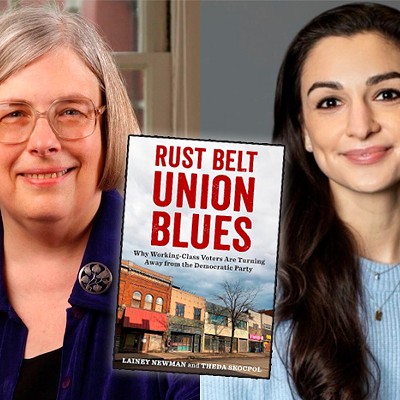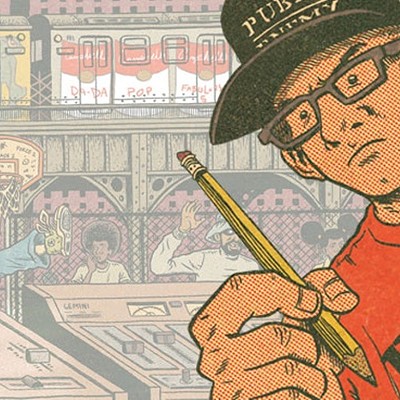Salman Rushdie's ninth and latest novel is, at first glance, nothing if not political. Sprawling across the 20th century as well as from Los Angeles to Europe and the Indian subcontinent, Shalimar the Clown nonetheless focuses on once-pacific, now strife-filled Kashmir, an isolated land contested for decades by India and Pakistan, Hindus and Muslims. Its key events include the assassination of an American statesman by a career Muslim terrorist -- the former village acrobat who's the novel's title character -- and other themes audibly echoing the global unease in today's headlines.
Rushdie's own story seems relevant: His family has its Muslim roots in Kashmir. In 1989, his irreverent depiction of Muhammad in The Satanic Verses prompted a fatwa from Iran's Ayatollah Khomeini, calling for Rushdie's death; in several countries, publishers or translators of the novel were attacked, one killed, and Rushdie himself, a bounty on his head, went into hiding for several years. Today he writes not only fiction but also newspaper editorials calling for an Islamic Reformation, challenging traditionalist elements within the faith to oppose Islamic radicalism by taking modern views of women's rights, homosexuality and freedom of expression.
But you'd err to call the inescapably political Shalimar a "political novel." Certainly it includes passages about how Kashmir served as the cradle for the alliance between Pakistan, the Taliban and al-Qaeda; and Rushdie's portrait of the eldritch rage of the Muslim fanatic is chilling. But the novel's world is also one of magical realism, where witchcraft is possible, ghosts abide and even an "iron mullah" is imagined as an apparently literal machine. Rich with playful language, it's a loving portrait of a prelapsarian Kashmir where Muslim and Hindu work out their differences peacefully (though perhaps grumpily). It's a work of great humor and satiric wit, with Rushdie inserting his characters -- a former U.S. ambassador to India named Max Ophuls, his youthful Kashmiri mistress, their secret, culturally disenfranchised daughter -- into the matrix of late-night talk shows and TV news as well as world history. And it's a novel of personal transformation, in which most major characters, from Shalimar himself (born Noman Sher Noman) to Ophul's daughter, start life with one name and end up with another, usually out of discontent with their inherited identities.
Of course the personal is political and vice versa, especially in a world where, as Rushdie writes, "Everywhere was a mirror of everywhere else." But for Rushdie, it's necessary to understand, and empathize with, even his heavies. Shalimar, for instance, spends most of the novel as its villain, but he too is a victim, and not unsympathetic. Interviewed via e-mail from London, Rushdie says such approaches are how art can affect the real world: "by offering readers a way to enter imaginatively into other worlds, other realities, other ways of seeing and being." He adds, "A novel uses strategies of love and understanding to sneak into its readers' consciousness. This is the only way a book can change the world: One reader at a time."
Rushdie has also helped change the world one writer at a time, and not only by himself surviving the world's most notorious fatwa. It was also his suggestion that led to the creation of the international Cities of Asylum program, which provides temporary shelter for writers persecuted in their home countries. Moreover, it was a talk by Rushdie during a 1997 visit here that inspired businessman Ralph (Henry) Reese to start a Pittsburgh chapter of Cities of Asylum, a project which bore fruit last year when Reese and his wife opened a North Side house they own to Chinese dissident poet Huang Xiang and his wife, Zhang Ling.
Prior to a talk and book-signing here Sept. 14, Rushdie will speak at a private fund-raiser for City of Asylum/Pittsburgh. Rushdie says he's "grateful to Pittsburgh for being a part of this important project. Unfortunately, it's still a dangerous world for writers."














